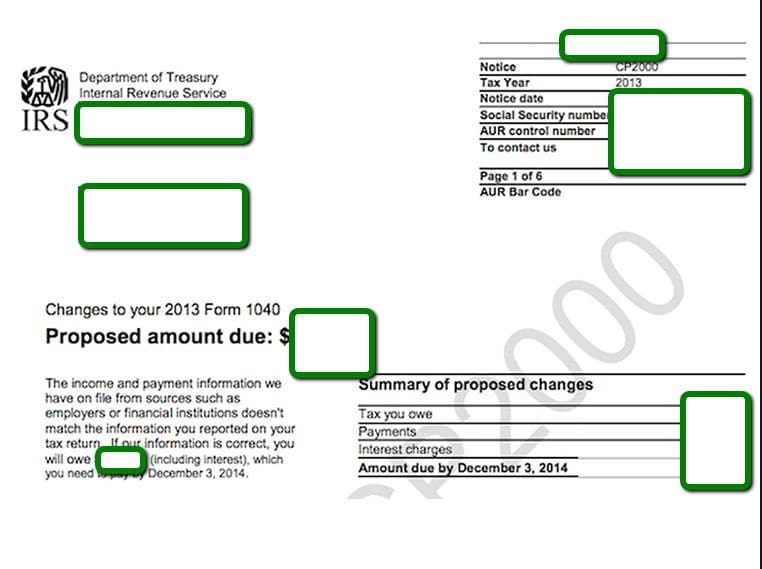[column width=”1/1″ last=”true” title=”” title_type=”single” animation=”none” implicit=”true”]
IRS Collection Notices – List of IRS Collection notices

When you have tax debt due with the IRS, eventually your account will go into IRS collections, especially if you do nothing. The collection process can actually take some time, even several months. Each collection notice comes typically five weeks apart.
Types of collection letters from the IRS
The IRS collection letters include:
CP 14. This notice is sent by the IRS when you have a balance due.
CP 501. This is the first reminder notice that you will receive from the IRS if you have an overdue balance due.
CP 503. This is the second notice to remind you of your balance due.
CP 504. This is when the IRS starts to get really serious. This is a Final Notice of Intent to Levy. This notice tells you that if the amount is not paid in full after this this third and final notice, the IRS will levy your state income tax refund.
CP 90. This notice represents the intent to seize assets and gives notification of your right to a hearing. Retirement benefits, salaries, real estate, automobiles, bank accounts etc can also be included in the levy.
CP 91/CP 298. This notice represents the intent to seize 15% of social security benefits to pay the unpaid balance.
CP 297. This notice represents the intent to seize assets and is sent to your business. The IRS intends to levy assets if no actions are taken.
LT 11/LT 1058. This letter is a Final Notice of Intent to Levy and Notice of Your Right to Hearing. This indicates that the IRS has made numerous attempts to collect. If no action is taken within 30 days, the IRS has the right to levy or seize assets. The IRS may also place a Federal tax lien on your property as well.
What are the most serious IRS Collection notices?
It is pretty easy to figure out that the most serious letters are:
- CP 90/297 Final Notice of Intent to Levy and Notice of Your Rights to a Hearing and;
- CP 91/298 Final Notice Before Levy on Social Security Benefits
These two notices are the only ones that allow the IRS to start proceedings to seize your wages, bank accounts, vehicles, real estate and business assets. The other notices can be important and urgent, but they are not threatening. Only the “final notices” give the IRS legal rights.
When you receive a Final Notice, realize that it provides important legal rights. These rights include the ability to file an appeal to have a hearing to settle the case and take the results to U.S. Tax Court if they are not acceptable. It is important to note that IRS collection action must stop while an appeal is pending provided it is filed within 30 days from the issuance of the notice.
What to do if you receive an IRS collection letter?
Generally, taxpayers are in a state of anxiety when they receive these types of IRS notices. It is important to stay calm and just read the letter….and check to see if it is a “Final Notice.” This is really when a taxpayer is in jeopardy.
If you agree with the balance due, look to tax resolution with a payment plan, currently not collectible status or offer in compromise. This decision must be done quickly as active collections are taking place. It is best to get tax help with a tax attorney to get a resolution put in place most advantageous to you and your financial situation.
If you do not agree with the balance due, submit the required information to substantiate your claim. And remember, when submitting any information to the IRS, always keep copies for your records.
The San Diego Tax Attorneys at Delia Law have many years of tax resolution experience and will competently represent you before the IRS. Please call for a no-cost tax attorney consultation for tax resolution at (619) 639-3336. We look forward to helping you.
This post is not intended as legal advice and should be considered general information only.
Keywords: IRS collection notices, IRS Collection Problems, IRS Collections, IRS Final Notice, IRS levies and property seizures, IRS Seizures
[/column]













